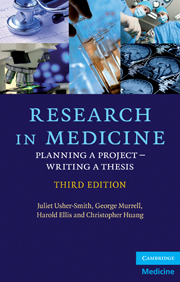Book contents
- Frontmatter
- Contents
- Preface
- 1 Introduction
- 2 Deciding whether to do research
- 3 Deciding when to do research
- 4 Selecting a research degree
- 5 Choosing a department, research supervisor and project
- 6 Applying for research positions and funding
- 7 Getting started
- 8 Overcoming frustration
- 9 Writing scientifically
- 10 Publishing a paper
- 11 Attending scientific meetings
- 12 Writing a thesis
- 13 Submitting a thesis and preparing for the viva voce examination
- Further reading
- Appendix: Information for research students wishing to study overseas
- Index
10 - Publishing a paper
Published online by Cambridge University Press: 05 May 2010
- Frontmatter
- Contents
- Preface
- 1 Introduction
- 2 Deciding whether to do research
- 3 Deciding when to do research
- 4 Selecting a research degree
- 5 Choosing a department, research supervisor and project
- 6 Applying for research positions and funding
- 7 Getting started
- 8 Overcoming frustration
- 9 Writing scientifically
- 10 Publishing a paper
- 11 Attending scientific meetings
- 12 Writing a thesis
- 13 Submitting a thesis and preparing for the viva voce examination
- Further reading
- Appendix: Information for research students wishing to study overseas
- Index
Summary
Deciding whether to write a paper
Hopefully at some point during your research you will acquire sufficient data to begin to publish your work in scientific or medical journals. In principle, the criterion for justifying preparing a paper is quite simple. You will have completed a substantial set of experiments that answer a scientific question in a number of important aspects, and you will have fully completed controls. Your findings then consequently come together to form a coherent body of knowledge that proves or disproves a particular hypothesis or provides information that is useful to the scientific community. However, judging the extent to which you have reached this point is a matter of experience. Your supervisor will be the best person to advise. In practical terms, having a number of submitted or published publications is a great reassurance as you plan your trajectory to finishing your research project. There are supervisors and research groups who encourage their students to write all their findings into research papers as their work proceeds. Completing a thesis is then greatly facilitated by simply assembling this work into a coherent whole!
Choosing when to write a paper
There are thus several advantages of publishing early on in your research period.
The exercise will concentrate your thoughts, reveal areas of inadequacy in your work and define areas for further testing. Thus the act of drafting a research paper itself facilitates your thinking about your work.
[…]
- Type
- Chapter
- Information
- Research in MedicinePlanning a Project – Writing a Thesis, pp. 87 - 96Publisher: Cambridge University PressPrint publication year: 2010



